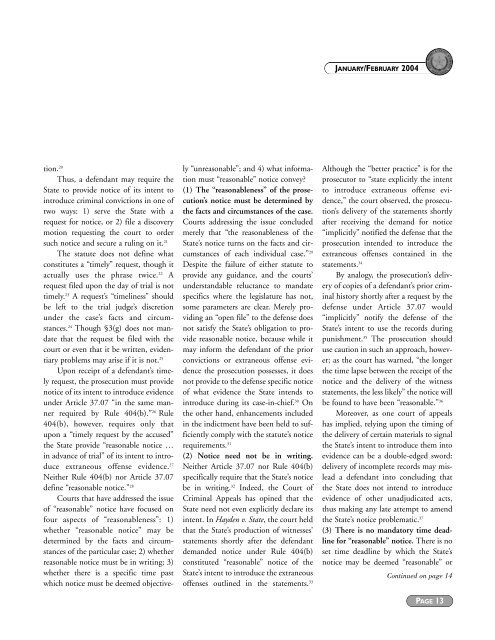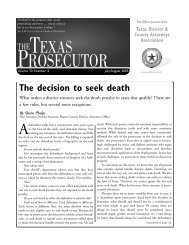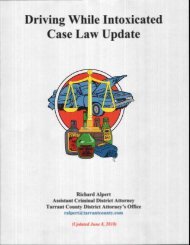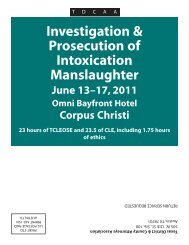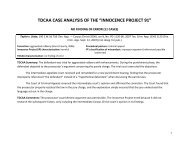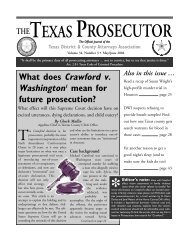Texas District & County Attorneys Association
Texas District & County Attorneys Association
Texas District & County Attorneys Association
You also want an ePaper? Increase the reach of your titles
YUMPU automatically turns print PDFs into web optimized ePapers that Google loves.
JANUARY/FEBRUARY 2004tion. 20Thus, a defendant may require theState to provide notice of its intent tointroduce criminal convictions in one oftwo ways: 1) serve the State with arequest for notice, or 2) file a discoverymotion requesting the court to ordersuch notice and secure a ruling on it. 21The statute does not define whatconstitutes a “timely” request, though itactually uses the phrase twice. 22 Arequest filed upon the day of trial is nottimely. 23 A request’s “timeliness” shouldbe left to the trial judge’s discretionunder the case’s facts and circumstances.24 Though §3(g) does not mandatethat the request be filed with thecourt or even that it be written, evidentiaryproblems may arise if it is not. 25Upon receipt of a defendant’s timelyrequest, the prosecution must providenotice of its intent to introduce evidenceunder Article 37.07 “in the same mannerrequired by Rule 404(b).” 26 Rule404(b), however, requires only thatupon a “timely request by the accused”the State provide “reasonable notice …in advance of trial” of its intent to introduceextraneous offense evidence. 27Neither Rule 404(b) nor Article 37.07define “reasonable notice.” 28Courts that have addressed the issueof “reasonable” notice have focused onfour aspects of “reasonableness”: 1)whether “reasonable notice” may bedetermined by the facts and circumstancesof the particular case; 2) whetherreasonable notice must be in writing; 3)whether there is a specific time pastwhich notice must be deemed objectively“unreasonable”; and 4) what informationmust “reasonable” notice convey?(1) The “reasonableness” of the prosecution’snotice must be determined bythe facts and circumstances of the case.Courts addressing the issue concludedmerely that “the reasonableness of theState’s notice turns on the facts and circumstancesof each individual case.” 29Despite the failure of either statute toprovide any guidance, and the courts’understandable reluctance to mandatespecifics where the legislature has not,some parameters are clear. Merely providingan “open file” to the defense doesnot satisfy the State’s obligation to providereasonable notice, because while itmay inform the defendant of the priorconvictions or extraneous offense evidencethe prosecution possesses, it doesnot provide to the defense specific noticeof what evidence the State intends tointroduce during its case-in-chief. 30 Onthe other hand, enhancements includedin the indictment have been held to sufficientlycomply with the statute’s noticerequirements. 31(2) Notice need not be in writing.Neither Article 37.07 nor Rule 404(b)specifically require that the State’s noticebe in writing. 32 Indeed, the Court ofCriminal Appeals has opined that theState need not even explicitly declare itsintent. In Hayden v. State, the court heldthat the State’s production of witnesses’statements shortly after the defendantdemanded notice under Rule 404(b)constituted “reasonable” notice of theState’s intent to introduce the extraneousoffenses outlined in the statements. 33Although the “better practice” is for theprosecutor to “state explicitly the intentto introduce extraneous offense evidence,”the court observed, the prosecution’sdelivery of the statements shortlyafter receiving the demand for notice“implicitly” notified the defense that theprosecution intended to introduce theextraneous offenses contained in thestatements. 34By analogy, the prosecution’s deliveryof copies of a defendant’s prior criminalhistory shortly after a request by thedefense under Article 37.07 would“implicitly” notify the defense of theState’s intent to use the records duringpunishment. 35 The prosecution shoulduse caution in such an approach, however;as the court has warned, “the longerthe time lapse between the receipt of thenotice and the delivery of the witnessstatements, the less likely” the notice willbe found to have been “reasonable.” 36Moreover, as one court of appealshas implied, relying upon the timing ofthe delivery of certain materials to signalthe State’s intent to introduce them intoevidence can be a double-edged sword:delivery of incomplete records may misleada defendant into concluding thatthe State does not intend to introduceevidence of other unadjudicated acts,thus making any late attempt to amendthe State’s notice problematic. 37(3) There is no mandatory time deadlinefor “reasonable” notice. There is noset time deadline by which the State’snotice may be deemed “reasonable” orContinued on page 14PAGE 13


